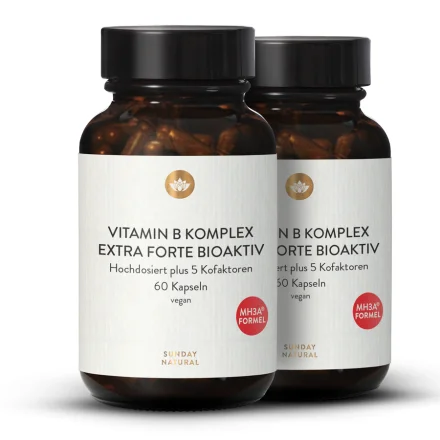Vitamin B Complex
The B vitamins are a group of water-soluble vitamins which work closely together and therefore depend on one another both directly and indirectly. As a result, the B vitamins can be considered their own tightly knit complex. Our B complexes supply the active coenzyme forms of individual B vitamins which we obtain from plant-based sources or nature-identical active ingredients.
Vitamin B Complex: Extra Forte
This high-dose complex contains all 8 B vitamins and the 4 cofactors CDP-choline, TMG betaine, myo-inositol and PABA. Premium active ingredients with bioactive forms of vitamin B12 from our MH3A® formula, folate from Quatrefolic® methylfolate and vitamin B6 in the form of active P5P. Highly pure and optimally bioavailable.
Vitamin B Complex: Forte
This high-dose, bioactive B complex contains all 8 B vitamins and 3 cofactors. Includes 300µg of bioactive vitamin B12 from our MH3A® formula, which contains all 3 natural cobalamins, folate from a complex of Quatrefolic® + Magnafolate® and vitamin B6 in the form of P5P. Complete with 3 cofactors: CDP-choline, myo-inositol and TMG betaine.
Vitamin B Complex: Sensitive
Non-methylated, bioactive B vitamins: a high-dose vitamin B complex designed for those sensitive to methylated nutrients. Includes taurine, glycine and glutamine to boost glutathione synthesis, vitamin B12 in the form of adenosylcobalamin, vitamin B6 in the form of P5P and choline in the form of active CDP-choline.
Vitamin B Complex: Plant-Based
A complete, purely plant-based organic vitamin B complex derived from 11 different herb and plant extracts. An authentic diversity of forms and natural purity is achieved through a gentle water extraction and delicate spray-drying process. Certified organic, high-dose.
Vitamin B Complex: Sprouted Buckwheat
Plant-based B vitamins from sprouted buckwheat. This complex supplies the active forms of B vitamins as found in food, derived from natural plant cell metabolism, and is enriched with vitamin B12 from our MH3A® formula, which contains all 3 natural forms of cobalamin.
Vitamin B Complex: Liposomal
All 8 essential B vitamins in a highly available form for significantly better absorption in the gut and at cellular level. True liposomal formulation due to the optimal ratio of B vitamins to sunflower phospholipids. Stabilised only with natural sea buckthorn extract; no soya, citric acid or synthetic preservatives.
Vitamin B Complex: Homocysteine
A synergistic, coordinated vitamin B complex supplying the bioactive B vitamins B6 (in the form of P5P), folate (in the form of Magnafolate® Pro) and B12 (from our MH3A® formula) for the targeted support of homocysteine metabolism, plus betaine (trimethylglycine) for an optimal complement to the formula.
Vitamin B Complex in Multivitamins
Our multivitamins provide comprehensive nutritional support. Vitamins I supplies all water-soluble vitamins (vitamin C and the B complex) in combination with other potent bioactives, powerful antioxidants, premium algae powders, mushroom extracts and select superfoods. Vitamins I is also available in a high-dose Forte variant. Our All in One provides a complete nutritional foundation, offering all important nutrients in just one supplement, and is also available in a special formula tailored for individuals following a vegan diet.
B Complexes in Comparison
| VITAMIN B COMPLEX EXTRA FORTE | VITAMIN B COMPLEX FORTE | SENSITIVE VITAMIN B COMPLEX: BIOACTIVE | VITAMIN B COMPLEX: HOMOCYSTEINE | VITAMIN B COMPLEX: PLANT-BASED | VITAMIN B COMPLEX FROM SPROUTED BUCKWHEAT | VITAMIN B COMPLEX LIPOSOMAL | |
| B Vitamins | |||||||
| Thiamin (B1) | 100mg | 50mg | 25mg | - | 6.7mg | 1.6mg | 1mg |
| Riboflavin (B2) | 50mg | 20mg | 10mg | 10mg | 8mg | 2.3mg | 1.5mg |
| Niacin (B3) | 150mg | 100mg | 50mg | - | 16mg | 28.4mg | 16mg |
| Pantothenic acid (B5) | 75mg | 50mg | 25mg | - | 10.7mg | 11mg | 6mg |
| P-5-P (B6) | 25mg | 20mg | 20mg | 20mg | 8mg | 1.5mg | 1.5mg |
| Biotin (B7) | 2500µg | 1000µg | 1000µg | 2500µg | 30µg | 99µg | 50µg |
| Folic acid/ bioactive folate (B9) | 1000µg | 400µg | - | 800µg | 320µg | 344.2µg | 250µg |
| Lemon extract (with folic acid) plus three bioactive brand ingredients | Lemon extract (with folic acid) plus three bioactive brand ingredients | - | Magnafolate® Pro | plant-based | plant-based | folic acid | |
| Cobalamin (B12) | 1000µg | 500µg | 350µg | 1000µg | 30µg | 500µg | 50µg |
| MH3A® | MH3A® | Adenosyl-, Hydroxocobalamin | MH3A® | plant-based | MH3A® | Methylcobalamin | |
| Cofactors | |||||||
| Citicoline | 25mg | 10mg | 10mg | 100mg | - | - | - |
| Betaine | 75mg | 50mg | - | 500mg | - | - | - |
| Inositol | 50mg | 25mg | 25mg | - | - | - | - |
| PABA | 50mg | - | - | - | - | - | - |
| NADH | 2.5mg | 1mg | - | - | - | - | - |




















